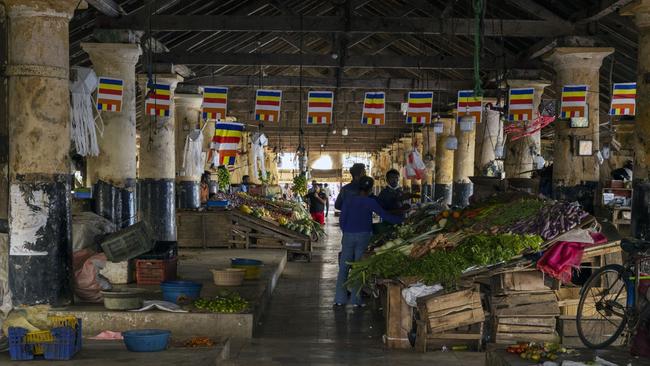The threat of an emerging market crisis is growing

In one short week Russia has defaulted on its US dollar sovereign debt and at the G7 meeting, leaders agreed to a $US600bn ($871bn) plan of funding for emerging markets to rival China’s Belt and Road initiative, to be in place by 2027.
In the last month the plight of Sri Lanka – which has defaulted on China’s BRI loans and is now in the vice of the Middle Kingdom’s strings attached funding – has become all too clear. How naive the Victorian government – whose memorandum of understanding with China on the BRI was torn up by the commonwealth in last year – turned out to be.
In 2027 it will be thirty years since the Asian crisis kicked off in July 1997 in Thailand when the Thai baht broke its peg with the US dollar. Emerging markets in Asia, which had been growing at 7 per cent slid to contraction. Indonesia’s GDP fell by 13 per cent. On October 27, 1997 the Dow Jones fell over 7 per cent – its biggest ever fall.
Emerging market leaders know all too well how quickly unrest can grip a nation if inflation or shortages put staple food beyond the reach of its citizens. And it opens up opportunity for influence for the world’s warring powers, China, the US and Russia.
Joining the G7 meeting this past week was Indonesian president Joko Widodo, the president of the G20 and one of six UN-appointed leaders to champion a crisis group created to deal with the threat of unprecedented world hunger and destitutions as a result of Russia’s war in Ukraine.
Jokowi is meeting with both Ukrainian president Volodymyr Zelensky and Vladimir Putin in an attempt to secure a grain corridor from Ukraine and food and fertiliser exports from Russia.
The double hit of the Covid-19 pandemic and then war has created a different spin on the classic economic crisis: how long lasting the negative forces around supply chain blockages, energy problems and inflation pressure is going to play out.
But if we do get a full blown emerging markets crisis, will this time be different? Or will it just make for another chapter for economists Carmen Reinhart and Ken Rogoff to prove that it never is different, and that so often behind these crises are big American lenders that become over exposed to the debt and do not seem to recognise the problem until it erupts.
Russia’s recent default on its sovereign debt is no exception and despite Jokowi’s pleadings to the G7, Zelensky and Putin it is hard to imagine sanctions easing when NATO allies are pressing for greater sanctions.
Many in the West believe sanctions on Russia have not hurt Putin as much as hoped. Ironically, the ones that will end up hurt when we are through the fog of war will be the holders of the US dollar denominated Russian sovereign debt that has defaulted. Around half of Russia’s $US40bn in foreign bonds are owned to foreigners, including firms like Blackrock, Pacific Investment Management, Legal & General and Citigroup.
One veteran of global commodity and currency markets told me that this default, confected by the West, is America cutting its nose to spite its face.
What is the point of orchestrating this Russian default, he asks. Remember the Yanks did this with Venezuela. Who lost? The US dollar bond holders.
Venezuela suspended payments to bondholders in 2017 and proposed a renegotiation of $US60bn in debt. But US sanctions against Venezuela, imposed to try to topple Nicolas Maduro cruelled the talks.
Maduro remains in power and a country that has virtually no cash has been saved billions of dollars. The state-owned oil company, PDVSA, has transferred virtually all of its assets to other entities. When sanctions lift, it is likely the bondholders will have almost nothing to show for it.
As a portfolio manager at Elliott Management, Jay Newman ran 13 year battle for the holdout bondholders after the Argentinian bankruptcy. He believes it will be very hard for security holders to get anything from the Russia default given the unusual and often vague bond documentation issued after Russia’s annexation of Crimea and the poisonings in Britain.
In this bizarre standoff, where some Russian money appears to have reached the clearing house Euroclear, there is no question of Russia’s ability to pay. The money is there, but the US government is stopping bond holders from receiving it. Russia has little or no need to borrow on international markets and if required players like Saudi Arabia and China might oblige anyway.
In a gripping column in the Financial Times last week Newman argues that emerging market debt – including Russian debt – is the cocaine for the global bond market. “Investors in emerging market sovereign debt are junkies — addicted to the illusion of higher yields. Truth be told, they’re also addicted to the adrenaline rush that comes from sitting at the high table to negotiate restructuring terms after a default,” he writes.
Newman, now an author, says the world is on the brink of an epidemic of emerging market defaults to rival the 1980s debt crisis.
Moreover Newman believes this time is different. The reason is China. “We are about to witness the first full-blown emerging market sovereign debt crisis in which a single lender – China – holds the whip hand,” he states.
It is this threat that the G7 is hoping to counter by launching infrastructure projects for developing countries that promises to be transparent and economically transformative.
The implications for a domino fall in emerging countries are hard to read but one of the concerns of the G7 is the lack of transparency in China plethora of Belt and Road financing where terms are secret. Just where does the debt rank on the security ladder and where does this leave future lending to developing countries already tied in under Belt and Road as tensions between the US and China continue?







The last thing the world needs now is an emerging market crisis. Yet as interest rates climb and the war in Ukraine blunders on, that threat is growing.